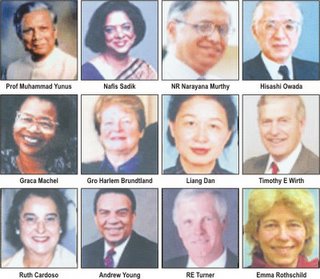The MDGs articulate the solemn obligations and commitments of the government to improve the economic and social lives of the people as fast as possible. These goals have been planned to be achieved by the year 2015. The failure to make reasonable progress in achieving the goals and targets enunciated in the MDGs will be considered as the failure of political leadership in the country.
The advent of democracy since the fall of president Ershad in January 1991 saw a series of economic reforms put in place by successive governments with greater macroeconomic stability, a move towards trade liberalisation, structural reform and economic deregulation. All these have resulted in a significant increase in the rate of growth in gross domestic product (GDP), with an average growth of more than 5% per year.
Faster economic growth has helped the country to reduce the poverty rate to a large extent since 1990. In fact, since independence Bangladesh “has achieved a positive development record in the face of extremely weak initial conditions, virulent and often times violent politics, fragile institutions and poor governance, frequent large-scale destruction by natural calamities, and the negative global image generated by these”. So the level and pace of economic and social development achieved so far are something to reckon with.
In Bangladesh, prospects for continued high economic growth of 5-6 per cent per annum over the next few years are good in view of current macroeconomic stability, reasonable savings and investment rates and the pace of economic reforms being pursued by the government. According to a recent World Bank assessment (Bangladesh PRSP Forum Economic Update, November 2005), the country’s economic growth could accelerate to 7-8 per cent if the government scales up its efforts to reduce regulatory costs, address infrastructure constraints (especially ports and power), deepen and improve the efficiency of the financial sector, improve labour quality, and further lower trade barriers.
Progress on many social measures has been encouraging. Primary enrolment for both genders is almost universal, and the secondary enrolment rate has more than doubled since independence. Bangladesh has already met the Millennium Development Goal on gender parity in school enrolment at secondary and primary levels. After Sri Lanka, Bangladesh is the only country in South Asia to have achieved this parity in education enrolment on gender basis.
The child mortality rate has halved, and life expectancy has increased by more than 15 years since independence. Another success in social sectors in Bangladesh is the significant and rapid decline in infant and child mortality rates. Infant mortality rates have declined from140 to 60 per thousand live births between1972 to 2000 while child mortality rates from 95 to 30 during the same period of time. The decline in infant and child mortality rates has been among the fastest in the developing world. Given the current rate of progress, Bangladesh and Maldives will be the only South Asian countries to achieve their MDGs of reducing infant and child mortality by the year 2015.
Population growth rate has also declined to a great extent, coming down to 1.5 per cent by mid-1990s. Women in Bangladesh have experienced vast improvements in their health during the past few decades due, in part, to an increased nationwide commitment to family planning and population control. In the early 1970s, very few women used any form of contraception to prevent pregnancy. Since that time, the contraceptive usage rate has skyrocketed from 3% to 54%. Likewise, the total fertility rate has declined from 6.4 to 3.3 children per woman. Women also get reproductive health services provided by the government medical centres and NGOs.
Today, family planning measures are widely used in Bangladeshi and women have taken a lead role in choosing the family size. The social stigma attached to the use of contraceptive has long gone, and through education, awareness, motivation, outreach, and commitment, contraception has become rather a social norm. As a result, women in Bangladesh are having smaller families and are now better able to fully participate in the communities and society.
Bangladesh has nearly achieved the safe water goal, with 97% of the population having access to pathogen-free water. Although Bangladesh has often started from a low base, it has achieved some notable success both in terms of the rate of progress and actual development outcomes compared to its neighbours as indicated by the table below.
Selected World Development Indicators:
Country Decrease in child mortality 1990-2000 (%) Maternal mortality ratio (per 100,000 live births) Decrease in fertility rates 1990-2003 (%) Increased access to primary education 1990-2000 (%) Child immunisation rates for DPT (%) Proportion of women employed in labour force (%)
Bangladesh -52 380 -29 59 85 68
India -29 540 -24 4 70 45
Pakistan N/A 500 -22 N/A 67 39
Nepal -29 740 -23 19 78 58
Source: World Development Indicators, World Bank, 2005
N/A = Data not available
It is apparent from the above table that on all six measures of social development Bangladesh has outperformed India, Pakistan and Nepal. The negative image of Bangladesh in terms of political violence, poor governance and corruption often suppresses the achievements the country has gained over the years in economic and social sectors.
The success of women in terms of education, training, employment and income-earning activities is very impressive. Women in both urban and rural areas are now heavily engaged in social, economic and cultural life in the society. Many barriers to women’s participation in the society have been removed in the last two decades, facilitated by both government and non-government organisations. This has made significant contribution to women’s emancipation in Bangladesh.
Micro credit is an area where Bangladesh has achieved outstanding success compared to many other developing countries in the world. The country is now known as the “motherland of micro credit”. According to the current estimates, about 15,000 NGOs, large and small, are registered with the NGO Bureau in Bangladesh. 9 million households have accessed the different kinds of micro credit, which has largely helped poverty reduction in the country, especially in rural areas.
Women have taken advantage of micro credit provided by different organisations such as Bangladesh Rural Development Board (BRDB), Grameen Bank, Bangladesh Rural Advancement Committee (BRAC) and Palli Karma Shahayak Foundation (an agency providing funding to government and non-government agencies engaged in implementing micro credit programs and projects).
In general, people in Bangladesh are resilient, flexible and adaptable. They are eager to change for the better if they are given opportunities. People understand the benefits of change and transformation and have a “will to develop” even under adverse circumstances. The remarkable success the country has achieved so far in different economic and social sectors reflects the indomitable spirit of the masses to move forward towards higher levels development, even under difficult political climate.







